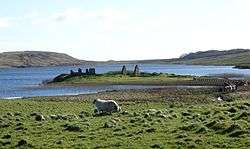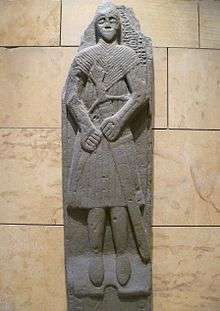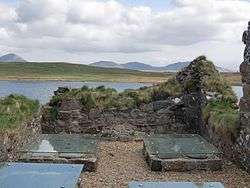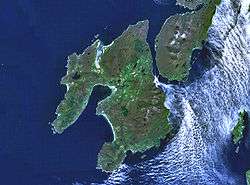Finlaggan
Finlaggan (NR 388 680, Scottish Gaelic: Port an Eilein) is a historic site on Eilean Mòr in Loch Finlaggan. Loch, island, and Finlaggan Castle lie around two kilometres (1 1⁄4 miles) to the northwest of Ballygrant on Islay.


Finlaggan was the seat of the Lords of the Isles and of Clan Donald. Two of the three islands that lie in the expansive scenery surrounding Loch Finlaggan,[1] Eilean Mor (large island) and Eilean na Comhairle (council isle), were the administrative centre of the Lordship of the Isles during the 13th to 15th centuries, until 1493 when the lordship of the Isles fell to James IV of Scotland, who administered the territory via a tenant-in-chief.
The Finlaggan Trust maintains the site and also refurbished a derelict cottage that has been converted into a comprehensive museum.[2] The centre contains numerous artefacts discovered during archaeological excavations: from a sheep wool quilted aketon, worn under armour, to an ancient cross related to the lords.
The site has been the subject of recent archaeological investigations and hosted an episode of Channel 4's archaeological television programme Time Team in 1995. During summer 2008 the centre was extensively refurbished and extended. The stone walls of a medieval chapel dedicated to St Findlugan on Eilean Mor have been stabilised and several 16th century graves put on display and covered by large glass panels. In May 2019, researchers at the University of St Andrews, working with the Finlaggan Trust and the National Museum of Scotland, announced the creation of a virtual-reality reconstruction of the settlement in the early 15th century, based on archaeological data. The reconstruction will be on show at the visitor centre.[3]
Finlaggan Castle

Finlaggan Castle (Scottish Gaelic: Port an Eilein, English: Port of the Island), also known as Eilean Mor Castle is a ruined fortified house located on the isle of Eilean Mór on Loch Finlaggan, Islay, Scotland. It was once a residence and stronghold of Lord of the Isles and Clan Donald.
In the first half of the 7th-century, a monastic community was established on Eilean Mor, the larger of the islands in the loch. This was either dedicated to or possibly founded by St Findlugan, an Irish monk and a contemporary of St Columba.
The ruins we see today are from a castle built in the 13th century, with masonry walls. An earlier construction, likely timber, was erected in 1138 by Somerled, Lord of Argyll, Kintyre and Lorne, the first "Lord of the Isles".[4]. The 12th-century building might have been constructed on the remains of an earlier Iron Age fort. The Lords of the Isles used the fortress as a principal court and meeting place of their clan chiefs. Iain Mor MacDonald, 3rd of Dunnyveg and his son Iain Cathanach MacDonald were taken prisoner at Finlaggan Castle, through the deception of Macian of Ardnamurchan for the hanging and execution of the governor of Dunaverty Castle and were later tried and hung on the Burgh Muir, Edinburgh. In 1541 Finlaggan was held from the Crown by Donald MacGilleasbuig. The castle appears to have been demolished in the 15th-16th century.
References
- "A view from Finlaggan Loch video"
- Scotland on TV Video interview with Donald Bell from Finlaggan Trust at the site's information centre
- "Lord of the Isles' medieval home in Islay recreated". BBC. 23 May 2019. Retrieved 25 May 2019.
- MacPhee, Somerled, Hammer of the Norse, 2004, at p. 68
External links
| Wikimedia Commons has media related to Finlaggan. |
